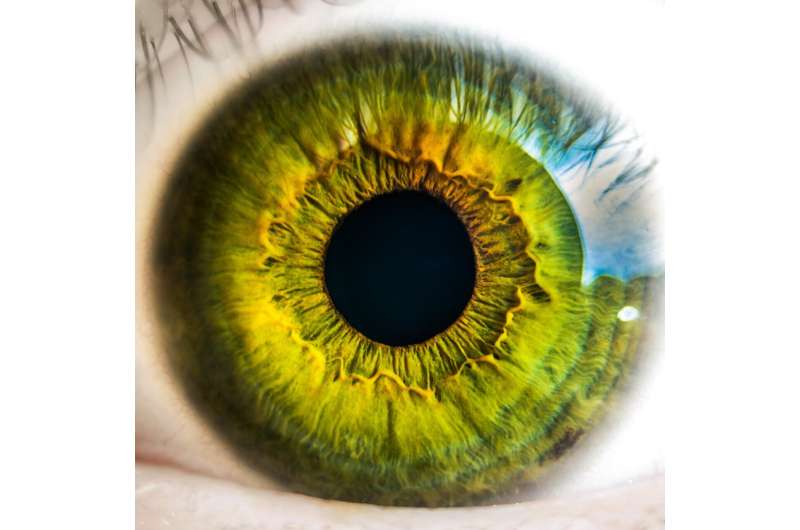This article has been reviewed according to Science X's editorial process and policies. Editors have highlighted the following attributes while ensuring the content's credibility:
fact-checked
peer-reviewed publication
trusted source
proofread
Robot radiotherapy could improve treatments for eye disease

Researchers from King's College London, with doctors at King's College Hospital NHS Foundation Trust, have successfully used a new robot system to improve treatment for a debilitating eye disease.
The custom-built robot was used to treat wet neovascular age-related macular degeneration (AMD), administering a one-off, minimally invasive dose of radiation, followed by patients' routine treatment with injections into their eyes.
In the landmark trial, published in The Lancet, it was found that patients then needed fewer injections to effectively control the disease, potentially saving around 1.8 million injections per year around the world.
Wet AMD is a debilitating eye disease, where abnormal new blood vessels grow into the macula, the light-sensing layer of cells inside the back of the eyeball. The vessels then start to leak blood and fluid, typically causing a rapid, permanent and severe loss of sight.
Globally, around 196 million people have AMD, and the Royal College of Ophthalmologists estimates that the disease affects more than 700,000 people in the UK. The number of people with AMD is expected to increase 60% by 2035, due to the country's aging population.
Wet AMD is currently treated with regular injections into the eye. Initially, treatment substantially improves a patient's vision. But, because the injections don't cure the disease, fluid will eventually start to build up again in the macula, and patients will require long-term, repeated injections. Most people require an injection around every 1-3 months, and eye injections, costing between £500 and £800 per injection, have become one of the most common NHS procedures.
The new treatment can be targeted far better than existing methods, aiming three beams of highly focused radiation into the diseased eye. Scientists found that patients having robotic radiotherapy required fewer injections to control their disease compared to standard treatment.
The study found that the robotically controlled device saves the NHS £565 for each patient treated over the first two years, as it results in fewer injections.
The study lead and first author on the paper, Professor Timothy Jackson, King's College London and Consultant Ophthalmic Surgeon at King's College Hospital, said, "Research has previously tried to find a better way to target radiotherapy to the macula, such as by repurposing devices used to treat brain tumors. But so far nothing has been sufficiently precise to target macular disease that may be less than 1 mm across.
"With this purpose-built robotic system, we can be incredibly precise, using overlapping beams of radiation to treat a very small lesion in the back of the eye. Patients generally accept that they need to have eye injections to help preserve their vision, but frequent hospital attendance and repeated eye injections isn't something they enjoy. By better stabilizing the disease and reducing its activity, the new treatment could reduce the number of injections people need by about a quarter. Hopefully, this discovery will reduce the burden of treatment that patients have to endure."
Dr. Helen Dakin, University Research Lecturer at the University of Oxford, said, "We found that the savings from giving fewer injections are larger than the cost of robot-controlled radiotherapy. This new treatment can therefore save the NHS money that can be used to treat other patients, while controlling patients' AMD just as well as standard care."
This study was led by researchers from King's College London and doctors at King's College Hospital NHS Foundation Trust, in collaboration with the University of Oxford, the University of Bristol and Queen's University in Belfast.
More information: Timothy Jackson et al, The Lancet (2024). www.thelancet.com/journals/lan … (24)00687-1/fulltext




















